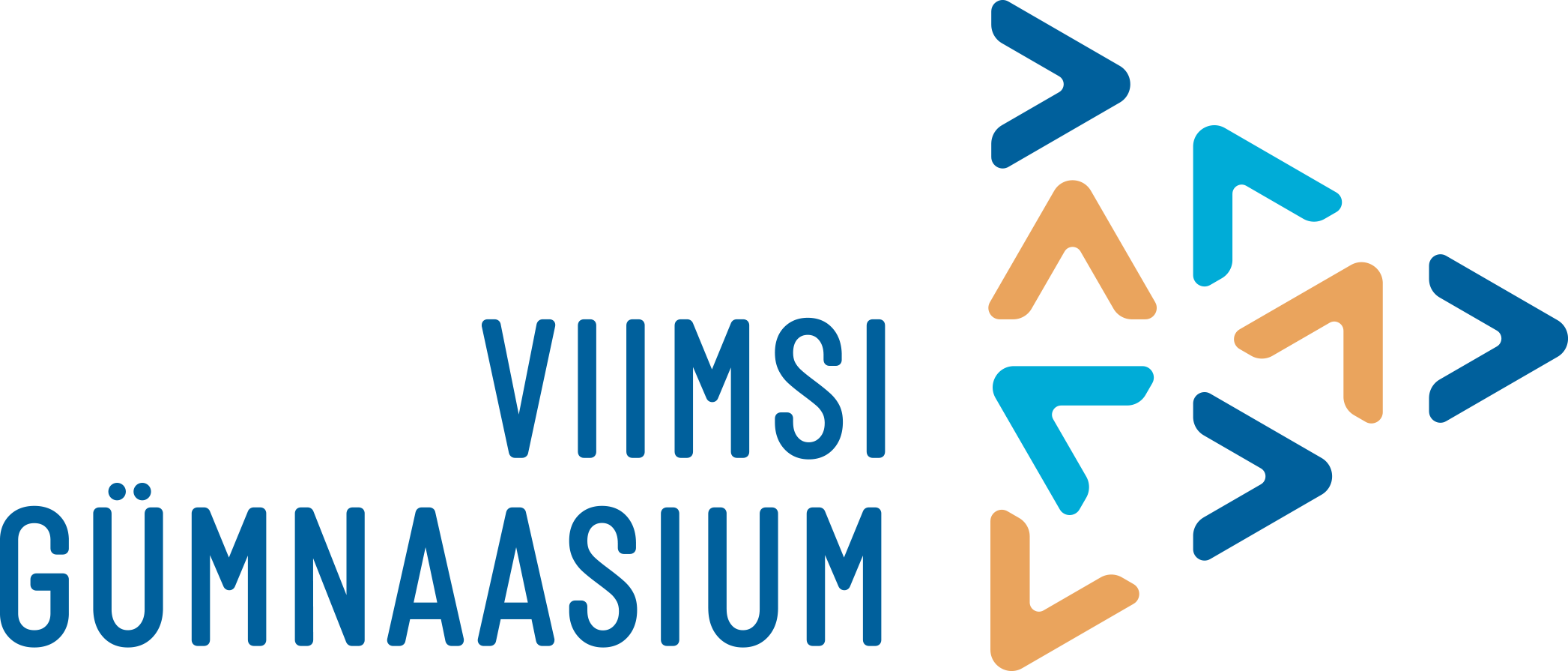OUR MISSION AND VISION
A graduate of Viimsi upper secondary school (hereinafter VGM) is a self-directed young person, which enables them to realize themselves in personal, work, and social life. A self-directed young person is an active learner with a growth mindset, a self-motivator, a goal achiever, adaptable, responsible, emotionally intelligent and active. Our task is to ensure a diverse and high quality upper-secondary education in a learning-supportive environment.
561
students
89
TEACHERS
102
subjects
11
PARTNERS
We
are
- innovative and entrepreneurial
- creative and open
- focused on the development of students
our
uniqueness
- possibility to choose between electives and module courses
- mentoring and groupcoaching
- maturity exam
- essential skills
- course "Self-Directed Learner"
- management system
our working principles
- we are developing 21st century learning culture
- we are learning professionals and mentors for our students
- we value creative, meaningful and thought-out undertakings
our
values
- presence
- collaboration
- openness
- mutual respect
- ongoing development
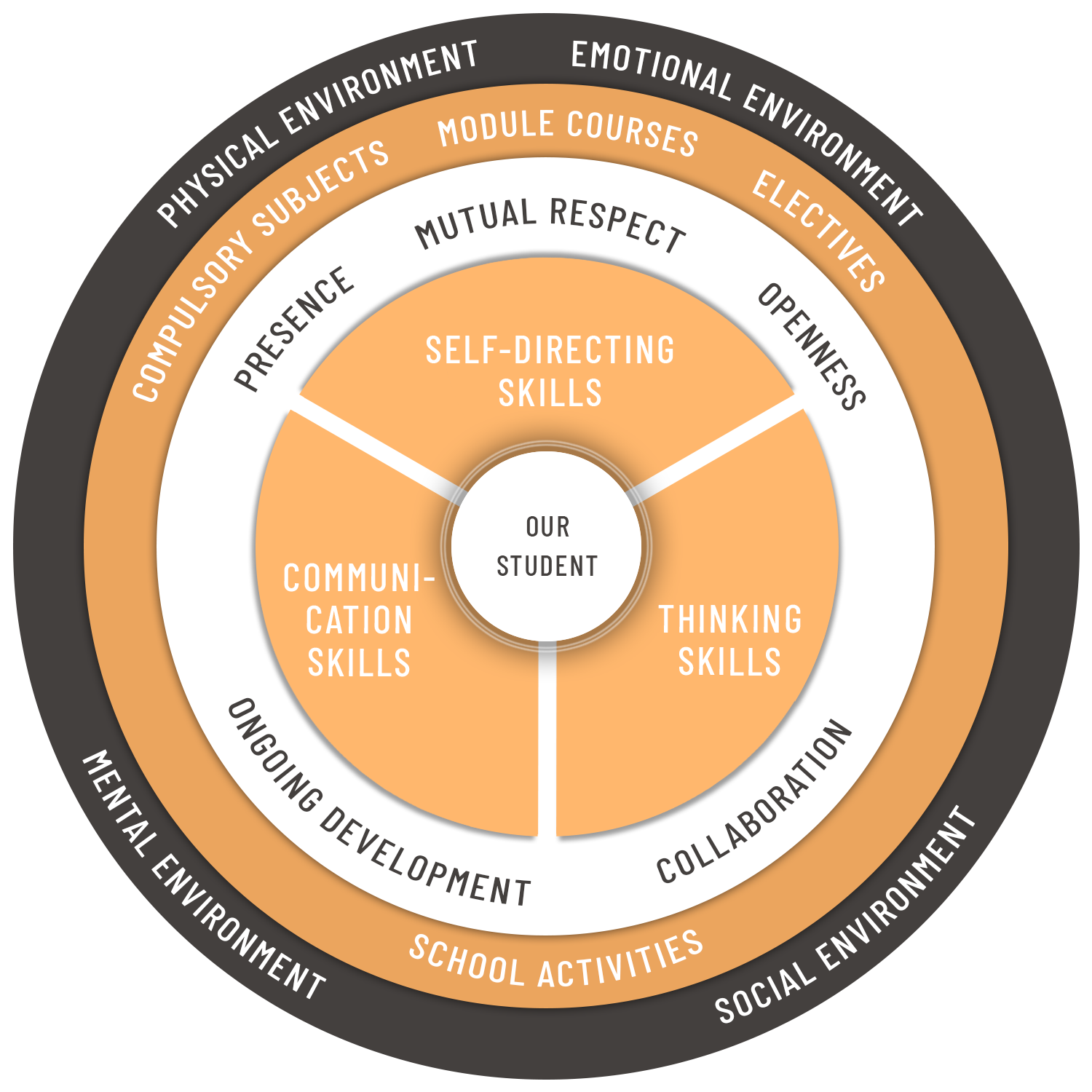
OUR APPROACH
In VGM, shaping a self-directed learner is the central to teaching and learning. Therefore, we consider it important to develop essential skills that help to cope with different situations and challenges in a rapidly changing world, in order to realize oneself in personal life, school, work, and in society. We respect one another. We believe that mutual respect, politeness, caring, tolerance, and keeping agreements are essential parts of a functioning work culture. We work together, learning from and with each other, seeking solutions and ideas that move us forward. We set goals together and dream boldly. We value presence. We listen and notice, staying mentally engaged and wholeheartedly present. We are open and curious. This way we recognize opportunities and exciting challenges. We share joys and worries. We consider ongoing development important. We believe in our abilities, we wish to learn and experience new things. We value every team member’s desire to improve and encourage exploration, reflection, and experimentation.
Mentoring system and Maturity exam
Our school has a mentoring system for students, where a larger study group is divided into two mentor groups. Each mentor group consists of up to 18 students and is guided by a mentor. The goal of the mentoring system is to support the development of a self-directed young person. In order to support the student, they must know themselves, and the teacher must have the opportunity to get to know their student. Through coaching-based mentorship as a way of thinking and communicating, the mentor can support the development, enhancement, or maintaining of intrinsic motivation. By using various skill-based questions, the mentor helps the young person get to know themselves, build self-confidence, and support their ability to cope.
Self-analysis plays a crucial role in the development of a self-directed young person, supported by the self-directed learner course and the creation of an e-portfolio for the maturity exam. The purpose of the maturity exam is to develop key competencies acquired during upper-secondary studies. To complete the maturity exam, students must analyze guest lectures, participate in job shadowing, engage in volunteer work, and take an oral assessment at the end of G3, where they present a key competency-based self-analysis. In this assessment, students demonstrate how they have developed their key competencies throughout gymnasium, providing examples from lecture analyses, job shadowing experiences, volunteer work, and school life.
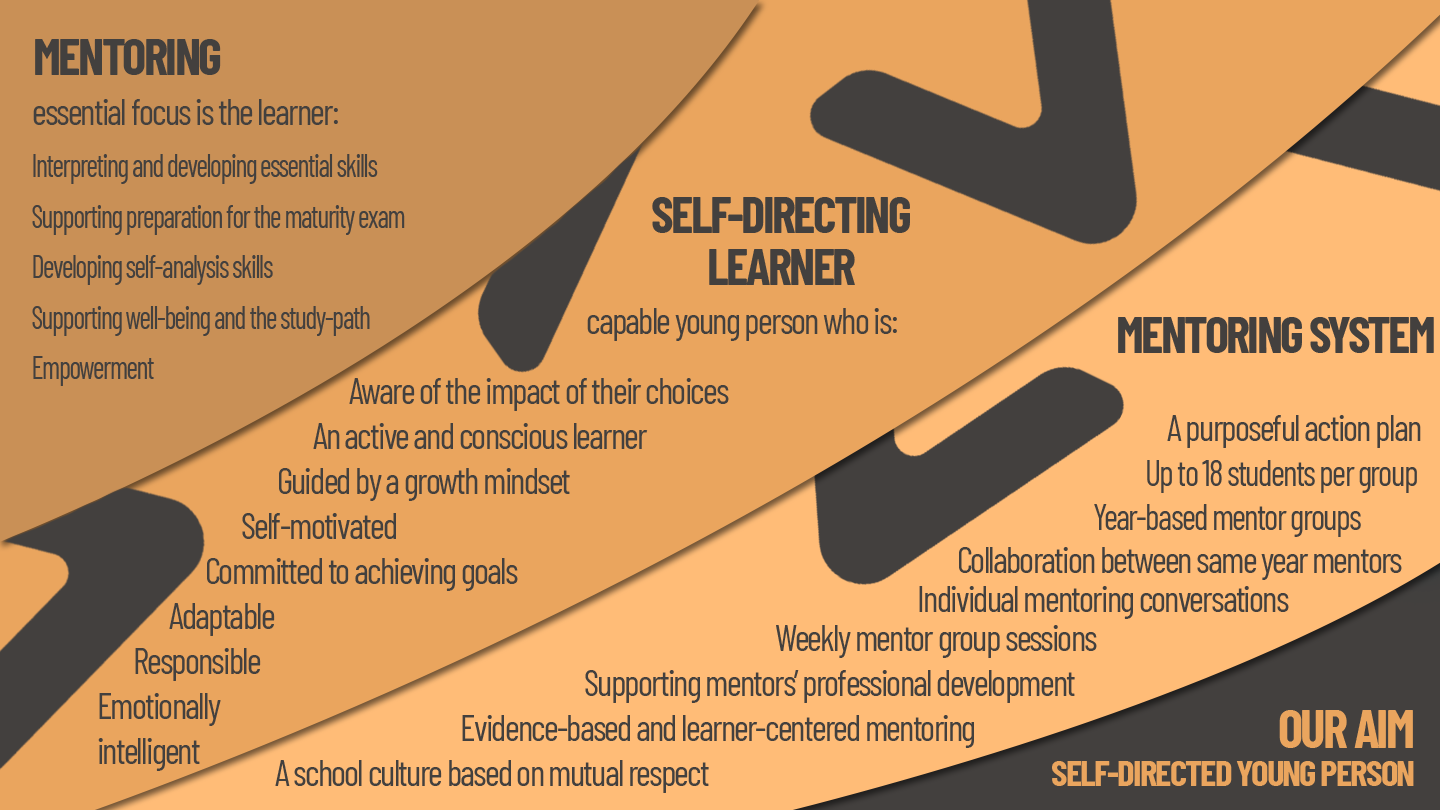
Flexibility in the learning process, choice options, and group-based learning
At VGM, it is important to support the learner’s development based on their interests and needs. This is made possible by flexibility in the learning process – the module system, B1 language exchange, and the choice between broad and narrow mathematics. Flexibility is further supported by a wide range of choices, allowing students to select different courses offered by the school, elective courses from universities and other organizations, and participate in the elective course week at other state upper-secondary schools. Additionally, extracurricular activities both inside and outside the school are considered part of the curriculum.
To ensure high-quality upper-secondary education and support further studies, additional courses have been introduced alongside the mandatory national curriculum. These include courses in broad and narrow mathematics, Estonian language, B1 foreign language, and B2 foreign language (English) to reach the C1 level. Foreign language proficiency is crucial as it enables students to continue their studies and work both abroad and in Estonia. In addition to C1 and B1 level languages, students also have the opportunity to study five courses of third foreign language at the A2 level.
To support the quality of education, group-based learning is implemented in Estonian language and literature, mathematics, foreign languages, physical education, self-directed learner courses, as well as elective and modular courses.
A VGM student must complete at least 96 courses during gymnasium, some of which are chosen by the student.
The state-mandated courses follow the national gymnasium curriculum (§11). Starting from the 2023/24 academic year, the course “National Defense Education” is included in the study load of newly enrolled students.
A distinctive feature of the school is the course “Self-Directed Learner,” which focuses on developing learning strategies, collaboration, and self-expression skills. The school has added additional courses for both broad and narrow mathematics, Estonian language, and B2-level foreign language (English) to achieve C1 proficiency, as well as B1-level foreign language. Additionally, the course “Fundamentals of Research” and the writing of research and practical work are included in the student’s study load.
As a continuation of previous language studies, B1-level foreign languages offered include Russian and German. Additionally, if a group reaches the minimum required number of students (generally at least 15), students in G1 may begin learning French, Spanish, or Finnish as a B1-level foreign language from the beginner level. For students who start learning a B1-level foreign language from the beginner level in gymnasium, 9 courses are required to reach the necessary proficiency level instead of the usual 6. The 3 additional courses are counted as elective courses.
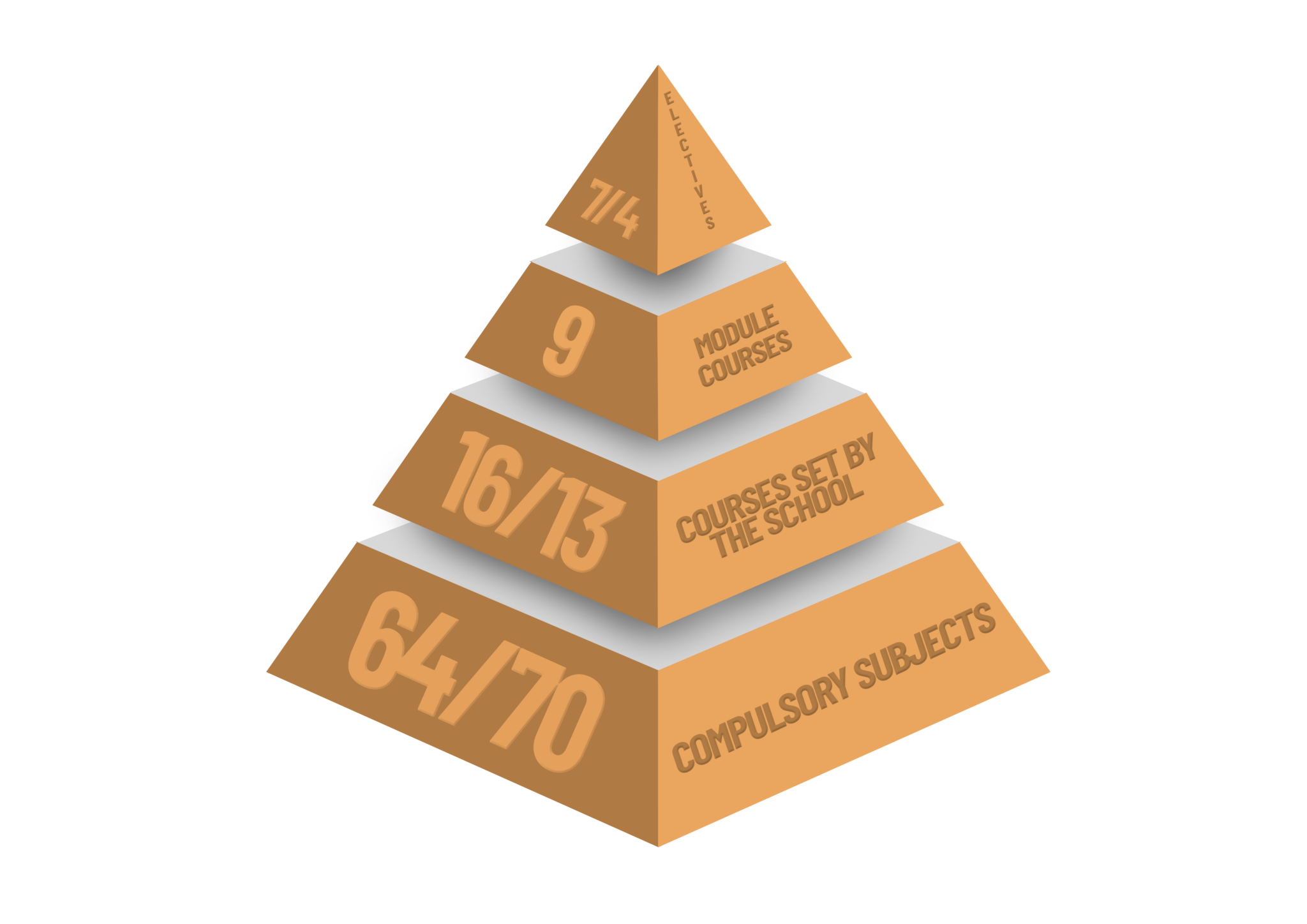
Selecting Modules and Elective Courses
In addition to mandatory courses, students must select a module each academic year. A module consists of a 3-course subject-specific package, allowing students to deepen their knowledge in a particular field. Each year, students can choose a different field or continue within the same area. Over the course of gymnasium studies, students must complete three modules, totaling 9 courses. Once a module is chosen, all its courses must be completed.
- G1 students select their first module upon admission.
- G2 and G3 students choose their module for the next academic year at the end of the current year.
- G2 and G3 modules can be fully replaced with an equivalent number of elective courses from universities or other organizations.
Students also have the opportunity to choose elective courses. The school offers both subject-specific and interdisciplinary elective courses, which are taught by VGM teachers and external partners. The selection of elective courses varies each year.
Most elective courses (except for mixed choir, school band, vocal ensemble, media and theater club, debate club, folk dance, student council, and A2 languages) are held during the 2nd academic period or the elective course week after the 3rd period.
Elective course selection takes place in October and March. If needed, students can drop a 2nd-period elective course within three weeks of its start. Later withdrawals result in a “not completed” status, and students must complete another course either at school or externally to receive credit.
A2-Level Foreign Languages
As an A2-level foreign language, students can generally choose from Finnish, Swedish, French, or Spanish. This selection requires completing 5 courses over two years: 2 courses in G1 and 3 courses in G2.
Our modules
G1
Practical Nature
Nature, Technology and Society
Climate Changes
Introduction to Economics
Economic Environment
Basics for Enterprising
Logic
Practical Physics
Mathematics – Extra and Basics
Culture Blast
Creative Writing
Mindblast
Athlete’s Self-care and Sports Organization
Sports Management and Endurance Sports
Sports Management and Ethics
Introduction to Media
The Possibilities and Threats of Social Media
TV Show Production
G2
Anatomy and Physiology
Healthcare
Chemical Processes and Health
Creating a Student Company
Student Company Management
Introduction to IT
Programming
Cybersecurity
Technical Drawing
Design Processes
Architecture as a Living Environment
Introduction to Project Management and Teamwork
Marketing Communication and Event Planning I, II
Literature and Film
Creating a Short Film
Film Analysis
Introduction to Recreation
Practical Psychology
Eating Healthy
G3
The Chemistry of Life
Applied Biology
The Physics of Life
Political Ideologies
Everyday Law
Crime and Justice
Introduction to Engineering
Modelling/Practical Robotics
Energy Efficiancy of Buildings/Technologies Used in Energetics
Contemporary Art
Creating Music
Practical Creation
The Globalizing World
Practical Psychology
Social Entrepreneurship
Introduction to Police and Border Patrol
Police
Border Patrol
Bootcamp
Managing and Leading Development
Creating a Learning Environment and Practice
My Role as a Leader of Change
Our electives
VÕÕRKEELED JA KULTUUR
- Spanish
- Finnish
- French
- Swedish
MUUSIKA, MEEDIA, DRAAMA, KUNST
- Mixed choir
- School band
- School media "Hüpernool"
- Drama club "Eksperiment"
- Debate club
- Relationships and communication
IT, TEHNOLOOGIA, REAAL
- Rakett 69
- Basics of Photography
- Digital games design
- Programming
LOODUS, LIIKUMINE JA TURVALISUS
- Health psychology
- Athletic excellence in basketball/volleyball and general physical training
- Analyzing humans
- Driver's basic theory course
- Training camp
ORGANISATION
The school year is divided into three study periods.
Courses last for 21 hours for 10-11 weeks.
At the end of every study period, there is a concluding week for prelims, study trips, some lessons etc.
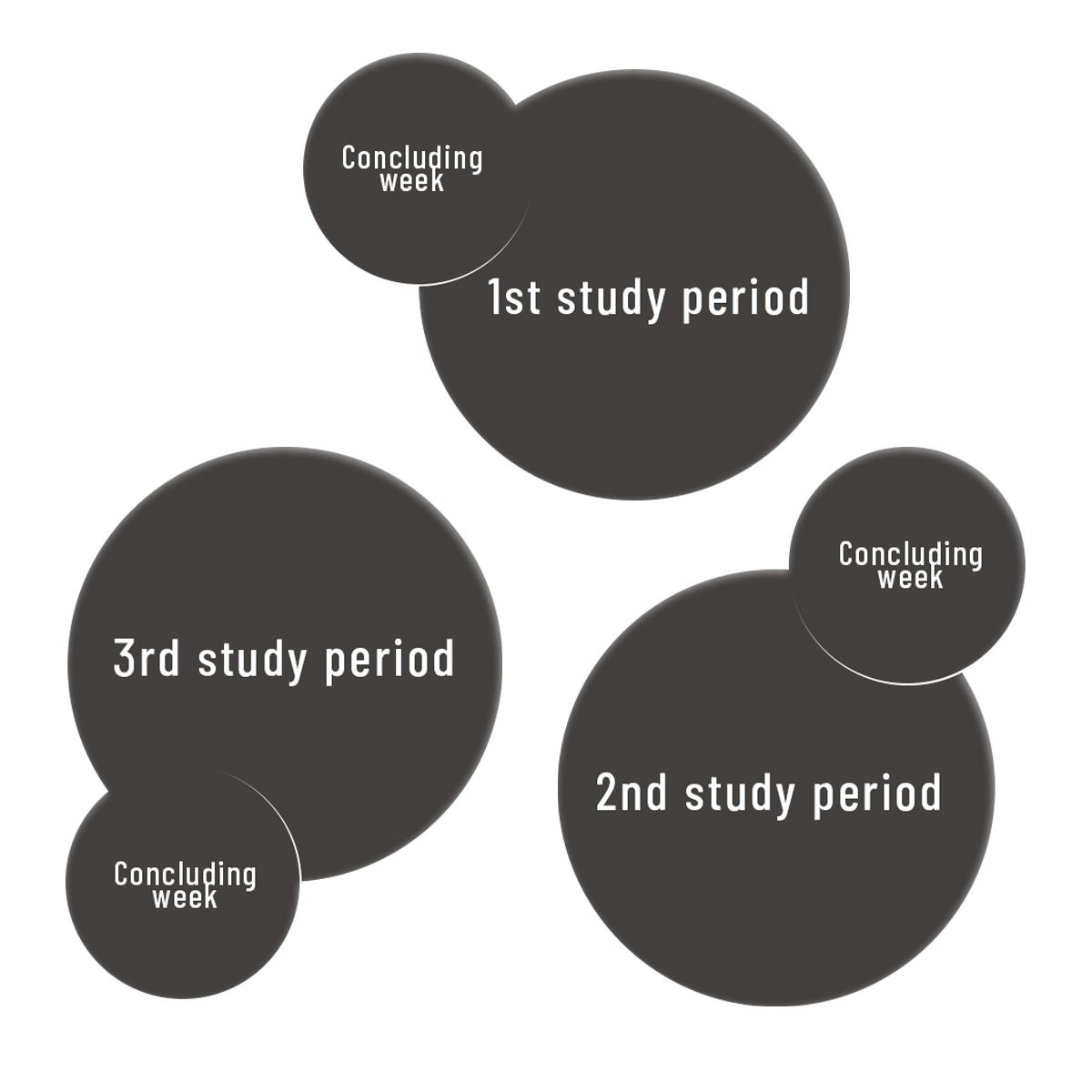
SCHEDULE
SCHOOL IS OPEN FOR STUDENTS FROM 7:00 – 20:00
LESSONS ARE 70 MINUTES
Collaboration with PARTNERS
In its daily life, VGM collaborates with various groups and partners.
The student council is actively involved in discussing and making decisions on key school matters. It also plays an important role in organizing events that enrich school life.
Parents contribute to the development of school life through the school board. Under the board’s initiative, community inspiration evenings are organized. Parents are also involved as elective course instructors, guest lecturers, and job-shadowing hosts.
An alumni representative is part of the school board and alumni are regularly engaged as course instructors and guest lecturers.
VGM maintains close cooperation with its governing body, the Ministry of Education and Research. We also collaborate with several universities, including the University of Tartu, Tallinn University of Technology, Tallinn University, and the Estonian Academy of Security Sciences. Other important partners include fellow state upper-secondary schools, Edumus School, the Estonian Unemployment Insurance Fund’s career center, Viimsi Science School, and Erasmus+ for international cooperation.
More information on our partners can be found here!
Student Council
Media team

